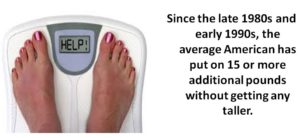Wealthy? Check! Healthy? Not so much!

Maybe you saw the news article in your local paper this week from The Washington Post announcing that for the first time in a decade, the United States was crowned the world’s most competitive economy by the World Economic Forum in Davos.
I wasn’t on their invitation list so I didn’t know it was going on, or who makes up the forum. Without my help, they scored the U.S. at 85.6 out of 100 against metrics that included infrastructure, information and communications technology, macroeconomic stability, health, skills and labor market.
Whew! So glad we were able to claw our way back to the top.
But wait. Three paragraphs later we see that the Forum also pointed out that the U.S. “is far behind most advanced economies in health, with life expectancy six years behind competitors Singapore and Japan.”
Maybe if we knew how to get healthy, that 85.6 could have bumped up against 100.
The fact is, we do know how to get healthy but it’s apparently just not a priority for most of us – until it is. That’s usually after the fit hits the shan. Then we are “all in” – and desperate to catch the horse long after it left the barn.
We know all we need to know
OK, I’m going to sound like a broken record so I hope you’ll forgive another rant or two. Repetition is still the mother of learning last time I checked.
Fact: The five major killers in the U.S. are heart disease, cancer, stroke, diabetes, and dementia. That hasn’t changed in decades, other than some repositioning in the stack ranking. Diabetes is now slowly working its way to the top as the biggest health threat. Our own American Medical Association recently announced that half of our American population is either diabetic or pre-diabetic and 70% don’t know it. OUCH!
Fact: All five are, for the most part, lifestyle diseases and are subject to intervention. Genetics plays, at most, a 30% role in the development of these diseases. In the words of Dr. David Katz, a physician at the Yale School of Medicine, and founder of an organization called the Academy of Lifestyle Medicine:
“We already know all that we need to know to reduce, by 80%, the five major killers in our country. We don’t need any more fancy drugs or equipment or more Nobel Prizes. We know all we need to know today.”
Fact: the meteoric rise in U.S. average life expectancy appears to have peaked, actually going backward in 2015. We’ve gotten very good at finding ways to kill ourselves early in the face of all that we know about how to do the opposite.
Fact: We’re getting bigger, but not any taller. This at the same time that Americans now spend more eating out than they do cooking at home.


Fact: The Standard American Diet (SAD) is deplorable and is killing us early. According to the website Forks Over Knives:
- 63% of America’s calories come from refined and processed foods (e.g. soft drinks, packaged snacks like potato chips, packaged desserts, etc.)
- 25% of America’s calories come from animal-based foods
- 12% of America’s calories come from plant-based foods
- Unfortunately, half of the plant-based calories (6%) come from french fries. That means only 6% of America’s calories are coming from health-promoting fruits, vegetables, whole grains, nuts, and seeds.
There’s a good reason we abbreviate standard American diet to S.A.D. The standard American diet leads to standard American diseases that lead to standard American deaths.
Fact: Our healthcare system cares little about what we eat and our food industry cares little about our health. Need proof? (1) Has your primary care physician ever initiated a conversation with you about what you eat? Not! There’s no box to check for that category in his electronic medical record. (2) Burger King just confirmed that meat and cheese cause nightmare diseases. The fast-food chain just launched the “Nightmare King” sandwich – a quarter pound of beef, a chicken filet, cheese, bacon mayonnaise and onions – which they openly claim is “clinically proven to induce nightmares.”
Fact: We’ve gotten very sedentary. The CDC’s National Center for Health Statistics just this year announced that only 23% of Americans meet national physical activity guidelines which, for adults, are 150 minutes of moderate or 75 minutes of vigorous exercise per week. Do the math: that means we can’t find .007% of our week to get our heart rate up. But we can find, on average 49 hours (29%) to veg out in front of the TV or on social media. A lack of physical exercise is now being equated to the equivalent of having a major disease.
What Can We Do?
Few things are simpler and more impactful than taking charge of our own health. The biggest overall killer is healthcare illiteracy combined with complacency and lethargy, all of which are addressable.
The formula is simple – but not easy, considering the deeply ingrained habits we function in.
Here’s an optimized plan as offered up by Dr. Henry Lodge, co-author of the best-selling book “Younger Next Year.” It’s referred to as “Harry’s Rules”:
- Exercise six days a week for the rest of your life
- Do serious aerobic exercise four days a week for the rest of your life
- Do serious strength training, with weights, two days a week for the rest of your life.
- Spend less than you make
- Quit eating crap!
- Care
- Connect and commit
Simple, but not easy. SAD if we don’t.





Thanks for sharing these scary health stats Gary! Agreed – being proactive and preventative in taking care of our future selves is simple yet NOT easy. Numerous reasons here why we need to bring to the forefront of our culture the importance of engaging in healthy lifestyle habits. Thanks for alerting us!
I have been exploring for a bit for any high quality articles or weblog posts in this sort of house . Exploring in Yahoo I eventually stumbled upon this web site. Reading this info So i am satisfied to convey that I’ve an incredibly good uncanny feeling I came upon just what I needed. I such a lot no doubt will make sure to don?¦t fail to remember this website and give it a glance on a constant basis.
Hello makeagingwork.com admin, Good job!
Dear makeagingwork.com owner, You always provide great resources and references.
Hi makeagingwork.com administrator, Thanks for the well-structured and well-presented post!
Thanks a lot for sharing this with all of us you actually know what you’re talking about! Bookmarked. Please also visit my web site =). We could have a link exchange agreement between us!
Hello makeagingwork.com owner, You always provide clear explanations and step-by-step instructions.
To the makeagingwork.com admin, You always provide great information and insights.
Hello makeagingwork.com owner, Thanks for the well-written and informative post!
Hello makeagingwork.com webmaster, Your posts are always well-delivered and engaging.
Hello makeagingwork.com owner, Keep it up!
Dear makeagingwork.com administrator, Good to see your posts!
To the makeagingwork.com owner, Your posts are always well-structured and logical.
Dear makeagingwork.com administrator, Thanks for the well-organized and comprehensive post!
Hi makeagingwork.com admin, You always provide great examples and real-world applications.